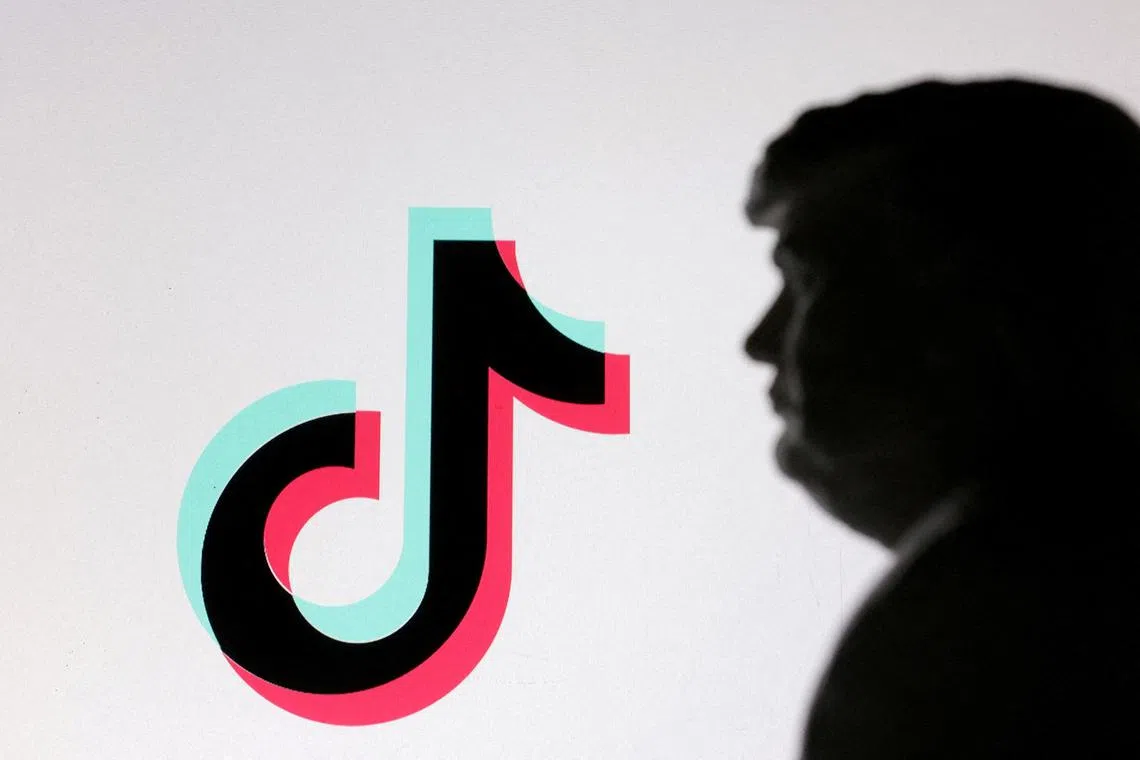News analysis
In TikTok sale, the White House is playing an unprecedented role as dealmaker
Sign up now: Get ST's newsletters delivered to your inbox

US President Donald Trump said four different groups are bidding on the popular short-video app.
PHOTO: REUTERS
Follow topic:
WASHINGTON - In the closely watched sale of TikTok, the White House is playing the role of investment bank, with US Vice-President J.D. Vance running the auction. It is an unprecedented level of involvement in a private deal by the country’s highest office that adds to the complexity of striking an agreement.
Mr Vance’s lead counsel, former Federal Election Commission chair Sean Cooksey, is the main contact for bidders for TikTok’s US assets, providing feedback and suggesting adjustments to their offers, according to bidder Reid Rasner, a Wyoming entrepreneur.
President Donald Trump said four different groups are bidding for the popular short-video app
“A lot of people want it, and it’s up to me,” he said on March 9.
While it is not unusual for Washington to meddle in the private dealings of publicly traded companies for strategic reasons, the White House’s direct oversight of the bidding process is extraordinary, said government ethics lawyer Richard Briffault, who teaches at Columbia Law School.
“I’m actually not aware of anything like this,” he said. “This is at the highest levels of the government, and it’s not clear this is a strategically significant company.”
The White House did not respond to requests for comment from Mr Vance or his team. TikTok did not answer a request for comment.
Mr Jeff Yass’ Susquehanna International Group, General Atlantic, Kohlberg Kravis Roberts and Sequoia Capital are among ByteDance’s US backers.
The sale has attracted interest from other billionaires and entrepreneurs. Project Liberty founder Frank McCourt is teaming up with Canadian investor Kevin O’Leary and Reddit co-founder Alexis Ohanian
Mr Trump has suggested the US could take a 50 per cent stake in TikTok’s US business.
The bidding process is anything but typical, Mr McCourt said. There is no defined set of assets, no valuation and ByteDance has not hired an investment bank to lead the deal, he told Reuters.
Beijing has a say in TikTok’s sale and ByteDance could shut the app down in the US, Mr McCourt said. The Chinese parent company is lightly engaging in talks, but not to the degree one would expect from a motivated seller, he said.
The negotiations are fluid, said several potential buyers, who have until April 5 to reach a deal. Mr Vance expects general terms of an agreement by the deadline, officials said.
Past US interventions
US officials have intervened in the private dealings of companies before. But it has mostly been to keep them from becoming abusive monopolies, to ensure foreign investors do not control American companies or to prevent financial firms from collapsing.
The Treasury Department also regularly reviews foreign investments in US companies that own or control sensitive technology, data or infrastructure, such as the US$14.9 billion (S$20 billion) bid for US Steel by Japan’s Nippon Steel
But the White House’s motivation in TikTok’s sale is unclear, Mr Briffault said. Congress banned the app during the Biden administration after it was designated a national security threat, requiring ByteDance to sell its US assets to an American buyer.
Mr Trump signed an executive order extending the Jan 19 deadline
“What makes this different is it doesn’t look like this company has significant strategic significance in the United States or that there would be significant financial or strategic harm to the economy or to the country if it left, if it did not sell,” Mr Briffault said.
Mr Trump has not been shy about protecting companies he likes, warning that vandalism against Tesla dealerships will be treated as domestic terrorism
TikTok’s sale price, the value of which widely varies, will depend on whether it includes its signature algorithm. Some equity analysts estimate it could be worth US$50 billion to US$100 billion with the algorithm, which captures user data and is seen as the business’ backbone.
ByteDance told employees in March its latest share buyback programme values the entire company at over US$315 billion, according to two people familiar with the matter. Mr Trump suggested the company could be worth as much as US$1 trillion.
Without the algorithm, TikTok would sell for US$40 billion to US$50 billion, Wedbush analyst Dan Ives estimated.
Mr Rasner, who submitted a US$47.45 billion bid for the US operations and algorithm, said his lawyers have been in touch with ByteDance’s Washington lobbyists, its general counsel and the White House.
“We want to do what we have to do to get this across the finish line,” he told Reuters. “And we’re willing to do anything.”
Mr Rasner declined to identify his backers, who he said include private equity investors.
“There are a lot of sharks in the water,” he said of the intensely competitive bid process. “We are navigating some very choppy waters, and there’s a lot of moving parts.” REUTERS

